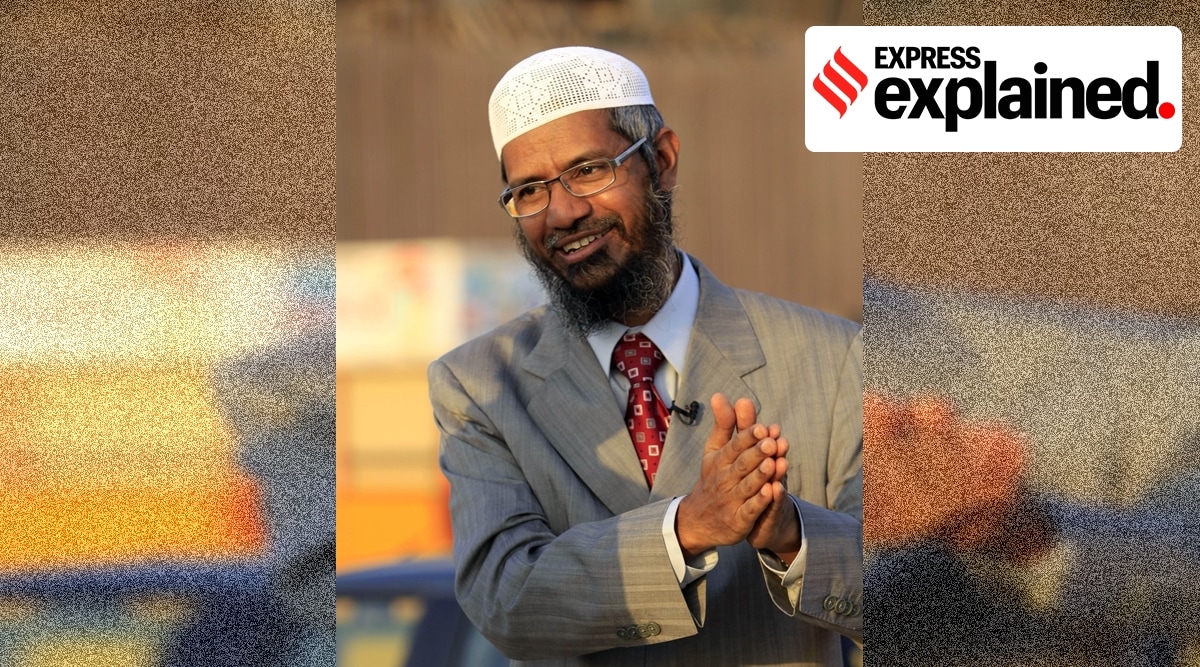Kerala train attacker inspired by Zakir Naik, say police. Who is this radical Islamist preacher?
Zakir Naik is a televangelist who founded Peace TV where he would preach about religion. In 2016, India’s counterterrorism agency accused him of promoting religious hatred and other unlawful activities.
 Islamist preacher Zakir Naik is currently a permanent resident of Malaysia. He faces multiple cases in India. (Express Photo by Ritika Jain/ File)
Islamist preacher Zakir Naik is currently a permanent resident of Malaysia. He faces multiple cases in India. (Express Photo by Ritika Jain/ File) Kerala Police have said that Shahrukh Saifi, the 27-year-old from Delhi’s Shaheen Bagh, who allegedly sprayed petrol on passengers of the Alappuzha-Kannur Executive Express and set them on fire on April 2, ultimately leading to the death of three individuals, was inspired by the Islamist preacher Zakir Naik.
Additional Director General of Police M R Ajith Kumar told reporters: “Saifi has been constantly watching the videos of Naik. He is highly radicalised and he came to Kerala with the determination to commit the crime. We have gathered all evidence to connect him to the crime.”
So, who is Zakir Naik?
Zakir Abdul Karim Naik, now 57, was born and educated in Mumbai, where he got an MBBS degree. When he was in his 20s, Naik involved himself in socio-religious activities, and eventually founded the Islamic Research Foundation (IRF), an organisation that was declared unlawful by the government in November 2016 under the Unlawful Activities (Prevention) Act, (UAPA) 1967. The ban was extended for another five years in November 2021.
Before 2016, the year that India’s counterterrorism agency accused him of promoting religious hatred and other unlawful activities, Naik was a popular televangelist who gave religious discourses on Peace TV, a UAE-based station that he had founded in 2006. Naik would typically wear a “modern” western suit along with the Islamic skullcap.
Peace TV is banned in several countries, including India, Canada, the UK, and Bangladesh. While extending the ban on the IRF in 2021, the Union Home Ministry accused the organisation of carrying out activities that were prejudicial to the security of the country, and had the potential of disturbing peace and communal harmony.
Naik, the notification said, has been “encouraging and aiding followers to promote or attempt to promote, on grounds of religion, disharmony or feelings of enmity, hatred or ill-will between different religious communities and groups which are prejudicial to the integrity and security of the country”.
Naik has always maintained that his statements have been “twisted” and “misrepresented”.
Naik came to international attention in 2016 — after one of the accused in the terror attack at the Holey Artisan Bakery in Dhaka (in which 24 people were killed by terrorists of the Islamic State), said he had been inspired by his speeches.
Where is Naik now?
Faced with charges of spreading hatred and money laundering, Naik fled India in 2016. The following year, he sought asylum in Malaysia, where he is now a permanent resident. India’s efforts to extradite him have not made much progress.
In 2019, Malaysia’s then Prime Minister Mahathir Mohamad had said his country had the right to not extradite Naik if he “would not be accorded justice” in India.
However, that same year, the preacher was banned from speaking in public, after he allegedly made racist remarks against Malaysia’s ethnic Hindus and Chinese communities. Mahathir said Naik was trying to “stir up religious feelings”. The preacher later apologised for those remarks.
In 2020, Naik claimed that the Indian government had offered him a deal if he would speak in favour of the removal of the special status to Jammu and Kashmir. In November 2022, there were reports that he had been invited to the football World Cup, which Qatar, the tournament’s host, denied.
There have been reports that Naik is the recipient of funds and support from countries like Malaysia, Turkey, and Pakistan, who would like to raise the issue of alleged mistreatment of Muslims in India in international forums.
Photos
- 01
- 02
- 03
- 04
- 05






































